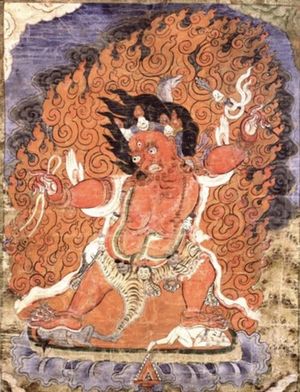Three neighs of the horse: Difference between revisions
Jump to navigation
Jump to search
mNo edit summary |
|||
| (One intermediate revision by the same user not shown) | |||
| Line 1: | Line 1: | ||
[[Image:Hayagriva-2.jpg|thumb|Hayagriva]] | [[Image:Hayagriva-2.jpg|thumb|Hayagriva]] | ||
'''Three neighs of the horse''' (Tib. རྟ་མགྲིན་གྱི་རྟ་སྐད་ཐེངས་གསུམ་, ''tamdrin gyi také teng sum'', Wyl. ''rta mgrin gyi rta skad thengs gsum'') is the [[mandala]] practice associated with [[Hayagriva]] or Lotus Speech. From Hayagriva's point of view the universe is gullible and the horse's neigh is to awaken and provoke gullible beings. | '''Three neighs of the horse''' (Tib. རྟ་མགྲིན་གྱི་རྟ་སྐད་ཐེངས་གསུམ་, ''tamdrin gyi také teng sum'', [[Wyl.]] ''rta mgrin gyi rta skad thengs gsum'') is the [[mandala]] practice associated with [[Hayagriva]] or Lotus Speech. From Hayagriva's point of view the universe is gullible and the horse's neigh is to awaken and provoke gullible beings. | ||
The three neighs are waking the world to the fact that [[ | The three neighs are waking the world to the fact that [[samsara]] and [[nirvana]] are non-originated, offering the whole world and demanding obedience. | ||
== Further Reading == | == Further Reading == | ||
* | *[[Chögyam Trungpa]], ''The Tantric Path of Indestructible Wakefulness (volume 3)'' (Shambhala, 2013) | ||
[[Category:03-Three]] | [[Category:03-Three]] | ||
[[Category:Kagyé]] | [[Category:Kagyé]] | ||
Latest revision as of 13:24, 29 February 2024

Three neighs of the horse (Tib. རྟ་མགྲིན་གྱི་རྟ་སྐད་ཐེངས་གསུམ་, tamdrin gyi také teng sum, Wyl. rta mgrin gyi rta skad thengs gsum) is the mandala practice associated with Hayagriva or Lotus Speech. From Hayagriva's point of view the universe is gullible and the horse's neigh is to awaken and provoke gullible beings.
The three neighs are waking the world to the fact that samsara and nirvana are non-originated, offering the whole world and demanding obedience.
Further Reading
- Chögyam Trungpa, The Tantric Path of Indestructible Wakefulness (volume 3) (Shambhala, 2013)